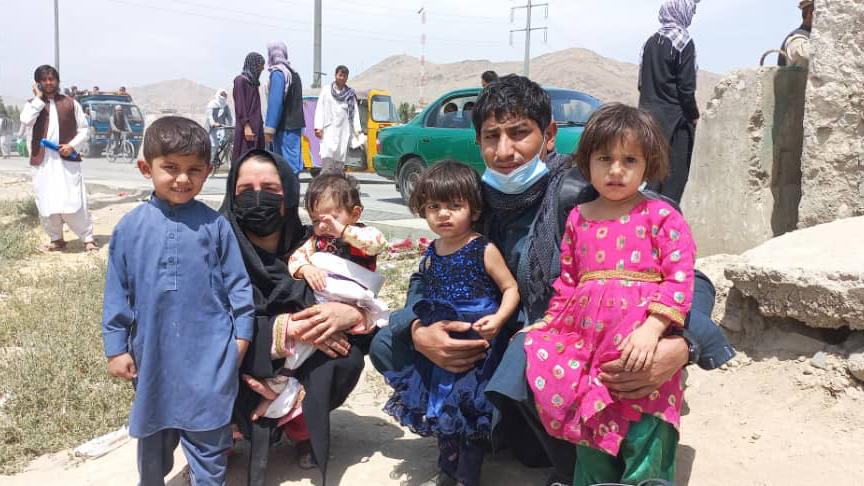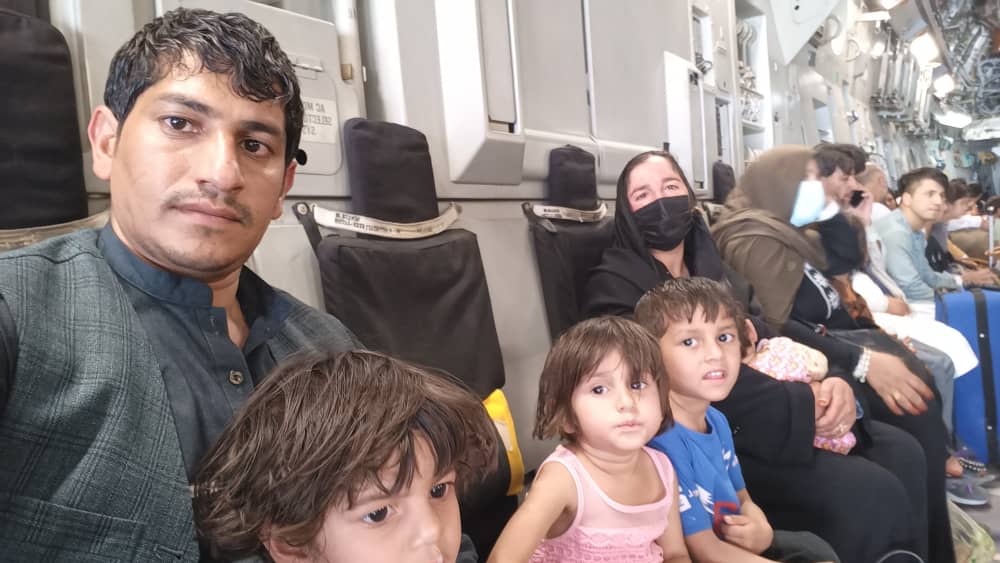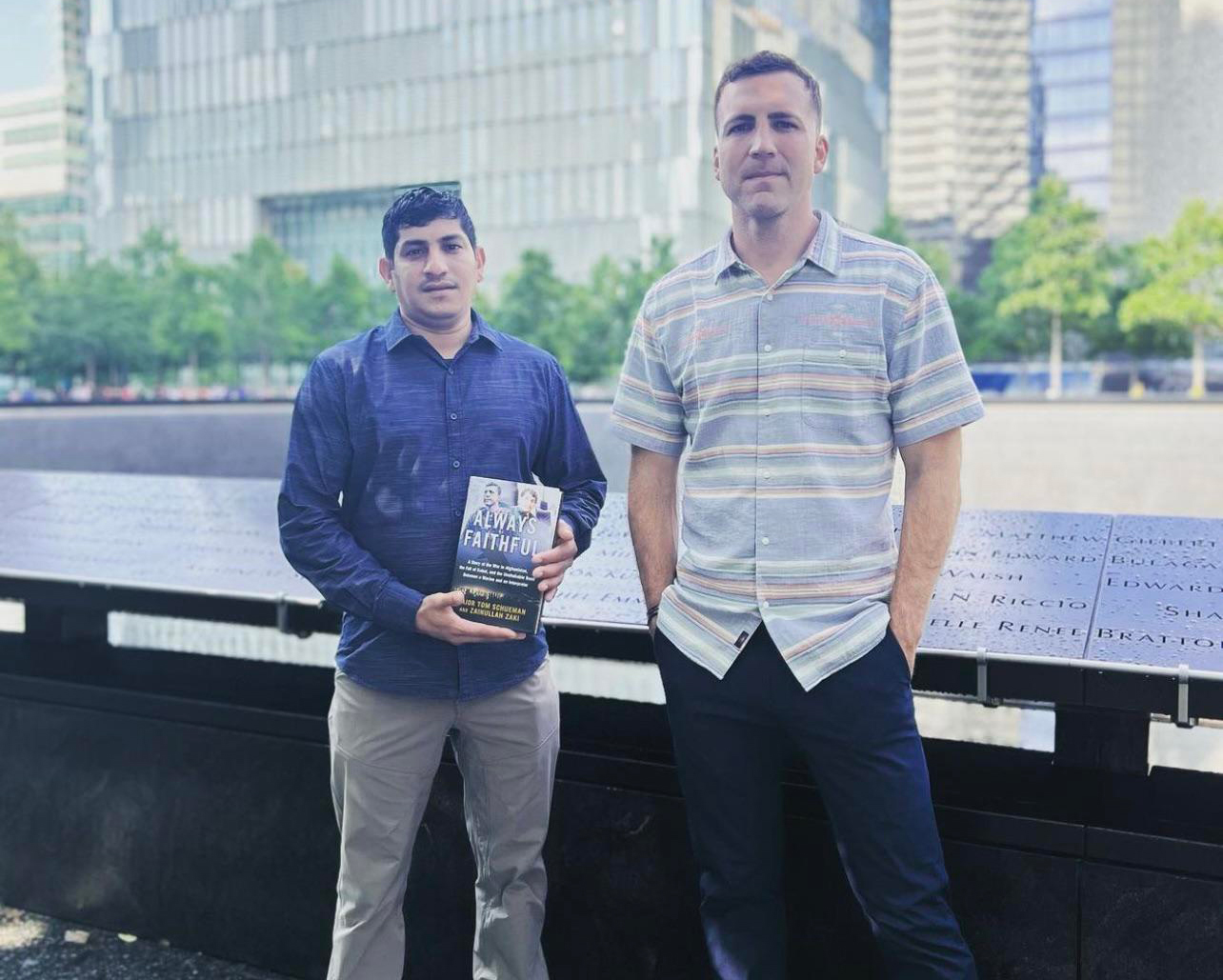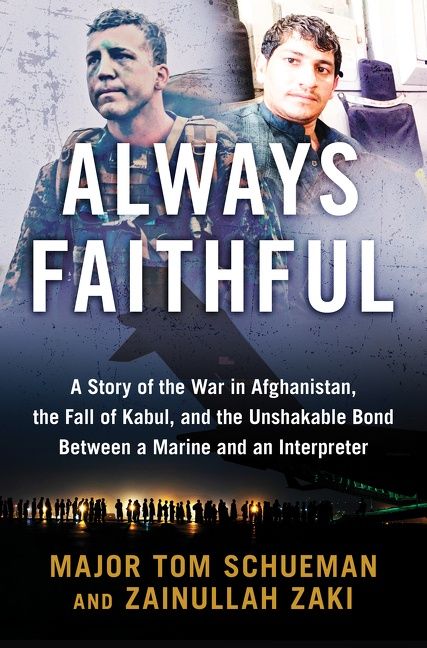
Zainullah Zaki Comes to Texas
Salvation South contributor Russell Worth Parker helped write “Always Faithful,” the story of how a U.S. Marine major worked to get his Afghan translator out of the country when it fell last year. Today, the translator is building a new life in Texas with his wife and four children. (With a review of the book by J.A. Dailey)
You wake up in the middle of the night to a ringing phone. On the other end is one of the few people left in this world you trust.
The voice, made faint by distance and increasingly unreliable cell service, tells you it is time for your family to leave for the last time your home and everyone you’ve ever known and loved. You look at the pile of six bags next to your four sleeping children. There is one for each family member, sized to carry everything you own. When you step into the night to walk 10 miles through a world coming apart at the seams, you and your spouse will carry those bags, along with the two children who are too small to walk. These people and the things you shoved in these bags are all you have left in this world. You’ve realized with a certainty forced upon you that they are all you need. There is no home now, only where you left and where you hope you’re going; really, anywhere other than here. You watch your spouse gently shake the children awake, knowing that soon enough you will be taking them into the dark streets of a dying city, hoping to escape a nation in chaos, via an airport you may not even be allowed to enter. You know because you’ve already tried and failed.
~~~
I learned about Zainullah “Zak” Zaki and Tom Schueman, the U.S. Marine major trying to help Zak escape the country he still deeply loves, in the months preceding the fall of Kabul, Afghanistan, in August 2021. Tom spent six months waging a guerilla social media campaign to save Zak and his family, his opponent as much the seemingly intractable United States government bureaucracy as the Taliban. I spent the same six months, the first of my retirement from the Marine Corps, actively trying to mentally distance myself from multiple deployments to Iraq and Afghanistan. By August 2021, I could no longer ignore the collapse of an effort that consumed the majority of the 27 years I spent in uniform. I spent the last two weeks of that month working around the clock from my home in North Carolina with a dedicated group of retired military and intelligence professionals, also with deep ties to Afghanistan, as well as hundreds of civilians moved by kindness, to try and help desperate people escape Kabul for anywhere else. Tom and Zak succeeded without us and, in the process, came to emblemize for me the only goodness in the whole sad, sorry affair.
Tom and Zak allowed me to help tell their rich story in "Always Faithful: A Story of the War in Afghanistan, the Fall of Kabul, and the Unshakable Bond Between a Marine and an Interpreter." It’s one as fraught with danger and blood and smoke as any war narrative. But it’s much more than that. Tom and Zak’s story honors the love, brotherhood and commitment of two men who shared the dangers of combat in Sangin District of Helmand Province. It’s about those two men keeping promises to one another, even when it put them both at risk. I hope you will read it and be inspired. But there’s a subsequent, largely untold, happier story happening now. It’s about perspective and it’s taking place in San Antonio, Texas.
~~~
Several of Zak’s cousins, themselves people who gave of their blood and treasure to build a nation that seemed to simply evaporate over a summer, relocated to San Antonio during the final years of the Islamic Republic of Afghanistan. The word went back to Afghanistan that San Antonio was a great place to be. Now, Zak and his family are part of an increasingly vibrant Afghan community of 3,000 people collectively writing a very American story of resilience, kindness and loyalty under desperate circumstances. It seems somehow appropriate that it’s happening in the home of the Alamo.
Zak never wanted to leave the mountains of Afghanistan’s Kunar Province. But when it was obvious that he could no longer keep his family safe in the only place he ever meant to call home, where he fought and served to make it better, he set his sights on San Antonio, just like Davy Crockett. It took six months of moves: from the madness of Kabul in August 2021, through displaced persons camps in Qatar and Germany, resettlement camps at Fort Dix, New Jersey, and Fort Pickett, Virginia, then a hotel in Minnesota, but Zak and his family eventually got where they wanted to be.
Perspective is something I fear we are losing in our increasingly fractured nation, and I feel regaining some collective understanding of just how good we have it as Americans, challenges notwithstanding, is critical to our survival.
I visited Zak twice at Fort Pickett in southern Virginia. The old barracks were designed for transient troops, not multi-generational families. Even by those standards, they are spartan. There Zak, his wife Deewa, his son Subhanullah, and daughters Sadaf, Taqwa and Husna lived for five months in a space smaller than my master bathroom. But I never heard a single complaint from Zak or anyone else there. I suppose preceding months of death threats will offer a certain perspective, one to which I wanted my 11-year-old daughter exposed. I took her with me the second time I visited. With three war zone deployments and a fair bit of time in developing nations, I felt I had seen enough to appreciate what I have here in America, with our neighborhood pool and the home owners’ association whose rules I complain about. But when I left Fort Pickett in the midst of a surprise blizzard, my daughter wearing earrings and leggings and a jacket given to her by people who kept most of their belongings in trash bags, I knew with certainty that I still have a lot to learn about perspective and need and generosity to strangers.

I’ve fallen far enough away from the church for my lapse to be a daily staple on my mother’s morning prayer list. Perhaps that makes my reflexive thoughts of the Bible ironic, even hypocritical. But I was baptized early enough, in a church deep enough in the South, it was impossible for me not to think of the book of Matthew, wherein Jesus said, “Truly I tell you, whatever you did for one of the least of these brothers and sisters of mine, you did for me.” Likewise, I think of Leviticus, “When a stranger sojourns with you in your land, you shall not do him wrong. You shall treat the stranger who sojourns with you as the native among you, and you shall love him as yourself, for you were strangers in the land of Egypt.” Zak is devoutly Islamic, so much so that he was known to finish his prayers under direct fire from the Taliban before moving to cover, but in his perspective on life and other people he’s done more to make me consider the state of my own faith than any hour spent on a Sunday morning.
~~~
Perspective is something I fear we are losing in our increasingly fractured nation, and I feel regaining some collective understanding of just how good we have it as Americans, challenges notwithstanding, is critical to our survival. I think Zak’s story, and the perspective it’s given him — that we all have the power to decide what the facts of our lives mean to us — offers us all a path to some kind of unity. As so many Americans seem to seek political poles, the facts of Zak’s new life — that he works 40 hours a week doing construction demolition, is reliant on public benefits available to new Afghan immigrants to feed his family and ensure they have medical care, and is trying to figure out how to take time off from hourly employment just to get his children registered in a school system he doesn’t fully understand — offer a host of divergent narratives for political opportunists. But in listening to Zak speak, I realize his outlook offers us all needed vantage point that has nothing to do with the people who seek to separate us through appealing to our lesser angels. A conversation with Zak reveals:
His apartment is “a really good place.” Shelter.
“We are near the HEB and Walmart.” Food.
“We have two mosques very close we can walk to.” Faith.
“Our cousins are a mile away, and they are helping me register the kids in school.” Family.
Maslow would probably be pleased.
~~~

As a people, Afghans are religious, deeply family-oriented and quick to find a reason to gather and eat together. Zak and his cousins in San Antonio are no different. He says, “My cousins are here. We just met a couple of weeks ago. We meet at each other’s house or we make a party in a park, we have barbecue, afghani pilau … it’s a big picnic. We all feel happy! We are together with a lot of people from Kunar, maybe 400 families. About 25 families are from my village. We help each other with everything: job, car, money.” Listening to Zak, I am reminded of my own Southern family, in which I could probably occupy most summer weekends exploring branches of the family tree at reunions in Georgia and Alabama.
"We all feel happy! We are together with a lot of people from Kunar, maybe 400 families. About 25 families are from my village. We help each other with everything: job, car, money.”
Of course, there are challenges. In fact, Zak says, “Everything is different, the roads, the villages, everything! In Afghanistan, there’s no traffic on the roads, no training for driving, no licenses. Here? There are signs and rules and signals. Houses in Afghanistan are made of rock and bricks; here it’s all drywall and Sheetrock. Everything is different than Afghanistan. Sometimes it makes me nervous.” It’s a wonderful place, but I feel the same way in New York City.
I often say I am not from the South; I am of the South. It’s a distinction that speaks to how I feel deeply rooted in a place, less mobile than others may be in our increasingly transient world. Just as deeply, Zak misses Afghanistan. America may be the land of opportunity and the place of which Zak says, “I am very grateful to the U.S. government and all my friends who rescued us and saved mine and my family’s life. I appreciate everything the people and government of America did for me.” But Afghanistan is his home. It is the place of his village, of his parents and siblings still there, and when he speaks to people there, they tell him of an increasingly downward spiral of poverty.
Despite the increasing desperation there, Zak speaks of his home’s beauty, the things from which I was masked in viewing a country through a decidedly military lens. He is clearly wistful when he describes swimming in the Kunar River and catching its sweet white fish; hunting birds on an island in the river; cool mountain air and snowmelt in springtime. But then he smiles and says of San Antonio, “Life is very good for our family. The kids are starting school next week and the school is very close. Deewa is working in the home, learning English from TV. The kids learn from watching cartoons. My health is good, my company gave me a drug test and they checked me out, the doctor says no problem! We are all good, all set.”
Perspective.
~~~
If Zak is sometimes nervous, he is also “very excited about the book coming out. I am nervous … but it’s good.” One can only imagine the magnification of excitement and nervousness if the movie Hollywood optioned about his escape comes to pass. August is seeing him — along with Tom Schueman — on ABC’s “Good Morning America, MSNBC’s “The Rachel Maddow Show” and Fox News. They visited Ground Zero in New York and will address crowds gathered in Los Angeles and Chicago.
But those things are fleeting. Soon enough, Zak will be back in San Antonio, tearing out drywall and petitioning the United States government for the same Special Immigrant Visa he’s been pursuing since 2016.
That’s a discordant note in such an amazing life, one in which he’s already demonstrated more loyalty to American ideals, under fire, than 99 percent of the nation. Asked if it was all worth it, he says, “I would still go to Sangin. I would go to Afghanistan now. If Americans go there, I will be the first person to go, as a translator or a soldier. I am ready for sacrifice, always ready.” It’s that perspective on both what he’s given and been given and his willingness to sacrifice that simultaneously set Zak apart and make such a compelling case for him as a future American citizen. Perhaps there we can all find a little perspective of our own.
A Review of "Always Faithful"
By J.A. Dailey
The only Latin phrase that most Marines know is the only Latin phrase that every Marine knows: Semper Fidelis — Always Faithful. To Marines, it is more than a motto; it is the underpinning of an ethos. Everything that it means to be a United States Marine issues forth from that simple concept — to be always faithful. Faithful to country, corps and comrades. But when bullets fly, the aperture narrows to the person on your left and right, and in narrowing, the oath intensifies. Bonds forged in combat aren’t easily broken by time or distance.
A review of "Always Faithful: A Story of the War in Afghanistan, the Fall of Kabul, and the Unshakable Bond Between a Marine and an Interpreter," by Maj. Tom Schueman and Zainullah Zaki
In most cases, this bond exists between Marines who have endured the hardship, humor and horror of training and battle together, but sometimes, when conditions provide the necessary heat and pressure, the circle of trust expands to include an outsider to the tribe who understands and embraces the idea of Semper Fidelis. In 2010, Afghanistan’s Sangin district provided the conditions, and Afghani interpreter Zainullah Zaki provided the resolve when he volunteered to serve as a translator with the Marines of 3/5, the Corps’ Dark Horse Battalion.

By the end of the seven-month deployment, the Marines of 3/5 would have a higher casualty rate than any unit in Afghanistan: 25 dead and 184 wounded, with 34 losing at least one limb. But it was that crucible that forged the bonds of Semper Fidelis between Zaki (called Zak by the Marines) and platoon commander Tom Schueman.
In “Always Faithful,” Schueman and Zak, with writer Russell Worth Parker (himself a Marine veteran of Afghanistan), tell their stories in alternating first-person chapters: Zak’s childhood in the Kunar Province, Tom’s in Chicago. Zak witnessing the rise of the Taliban, Tom experiencing the struggles of being raised by a single mother, a self-described ‘hippie’ who became a Chicago Police officer to support her children.
Tom and Zak’s lives collide at Patrol Base Fires, in the Sangin. Tom was there to test himself, Zak to fight for an Afghanistan where his daughters could go to school. Throughout the deployment, Tom and his Marines proved their willingness to fight for a better Afghanistan, and Zac, his willingness to fight for them. The bonds of Semper Fidelis were forged in iron and in blood in a country that has watched nations break themselves against its deserts and mountains for a millennium.
Tom returned to the states in April 2011, and his only contact with Zak was via sporadic Whatsapp connections. Zak continued to work with U.S. forces off and on until he began receiving “night letters,” threats from the Taliban left at his door in the darkness, and phone calls promising death to him and his growing family.
When Zak reached out to Tom for help, true to his pledge, he began working tirelessly to help Zak wade through the inexplicably complex morass of the Special Immigrant Visa (SIV) process. But in Washington, the wheels turn slow, and when the U.S. announced the intention to withdraw all remaining forces from Afghanistan, Zak was still waiting.
The final chapters of “Always Faithful” are paced like a Robert Ludlum novel. Zac, with his family in tow, dodging Taliban checkpoints, threads through the frantic crowds in a final push to get to the Kabul airport. Back in the states, Tom and crews of mostly retired military personnel worked the phones, serving as a conduit between Zac and others like him, and Marines manning the gates and watchtowers of the shrinking security perimeter. These volunteers were saddled with the self-imposed Sisyphean task of connecting the correct interpreter with the correct Marine amid the chaos of the Kabul airport, using hand signals and shouted codewords.
Zak and his family were lucky; they were identified and ushered through the perimeter and loaded aboard one of the final flights out of Afghanistan. Now, settled at least temporarily in the U.S., he is still waiting and hoping for his SIV to be approved.
As we approach the first anniversary of our bungled withdrawal from Afghanistan, “Always Faithful” reminds us of the promises America made to the Afghans who stood with us, and the debt we still owe them.
About the author
Russell Worth Parker is a retired United States Marine turned writer. He lives in Wilmington, North Carolina, with his wife and daughter. Worth writes for an array of publications including The New York Times, Garden and Gun Magazine, Salvation South, Backcountry Journal, Shooting Sportsman Magazine, Salt Magazine, and websites such as SOFLETE.com, DieLiving.Com, and several commercial and nonprofit websites.






Beautiful story Russel! Can’t wait to read the book. We are humbled by Zak’s family story in a way that the nation seems to have forgotten how to feel about living in a deeply flawed, but such a land of promise!